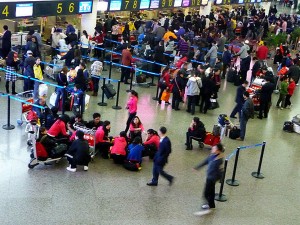While the comforts of home allow us to walk around with our bags unzipped and our phones in our back pocket, when arriving on foreign territory it pays to be more careful.
Every year, countless Australians fall victim to theft while travelling abroad. I too joined this group on my first day in China when my wallet was stolen and my bank account drained. Travel expert and STA travel agent, Irene Tan, says stories like mine are all too common.
And, while China is far from ranking among the world’s top theft zones, stealing can occur anywhere.
“The most common places to have your belongings stolen are Mexico and Asian countries,” Tan says.
No matter where you’re heading, before departing it’s a good idea to check out websites like smartraveller.gov.au. Here, you can register your travel with the Australian government, find safety ratings of different countries and read up on basic travel tips.
While it’s easy to find tips on preventing theft, there’s little information on ways to cut down the impact of theft if it does occur.
There are a number of things you can do before you leave to reduce this risk.
 Cleaning out your wallet and taking only the cards you need means if your wallet is stolen, you won’t have to replace every loyalty card you own.
Cleaning out your wallet and taking only the cards you need means if your wallet is stolen, you won’t have to replace every loyalty card you own.
Also exchanging currency in Australia and splitting it between your locked suitcase and your wallet will always leave you some emergency cash. The same goes for bank accounts. Don’t risk keeping all of your money in one account.
Tan also advises to use a cash passport instead of a bank card. This is one of many brands of pre-paid travel cards that allow limited access to your money supply.
An obvious strategy is never to carry too much cash. But if it is necessary Tan says, “The best thing to do is always wear your wallet on a belt.”
If your valuables are firmly attached and concealed under clothing then you become a much less of a target. A good idea is to buy a money belt that sits around your waist. It should be big enough to carry your passport, cash and cards.
After hours up in the air, you finally touch down at your destination. What now? While public transport may seem like the cheaper option, Tan suggests taking a more direct route to your hotel via a taxi or private shuttle bus. Between suitcases, handbags and possible jet lag it can be hard to keep track of everything. The last thing you want to do is make yourself an easy target for pickpockets on the street or on public transport.
But despite all of these precautions,Tan says sometimes thefts are inevitable.
“If someone wants to rob you, they will rob you no matter what.”
It could happen to anyone and if that anyone happens to be you then there are procedures that need to be taken. The obvious ones are to cancel your cards, contact police and your insurance company, however, sometimes these can be difficult.
While at home you can always rely on Facebook and Twitter to contact people. But keep in mind that countries like China don’t allow access to these websites. If you don’t yet have access to a local phone, but can find Wi-Fi, you can use Skype to call mobile phones and landlines. Another way to contact people through Wi-Fi is using apps such as Viber or iMessage. These allow you to call and text other phones with the given apps for free.
While this may have scared you into cancelling your next holiday, know that most overseas trips encounter few problems. Chances are you will return home with new destinations already in mind. There is nothing more addictive than foreign travel. The only thing you need to beware of now is the travel bug, it can sometimes prove more expensive than theft.
 Tahlia McPherson is a third year Bachelor of Journalism student at La Trobe University and is one of upstart’s staff writers. You can follow her on twitter: @TahliaMcPherson.
Tahlia McPherson is a third year Bachelor of Journalism student at La Trobe University and is one of upstart’s staff writers. You can follow her on twitter: @TahliaMcPherson.
Photos by Wikimedia Commons.







